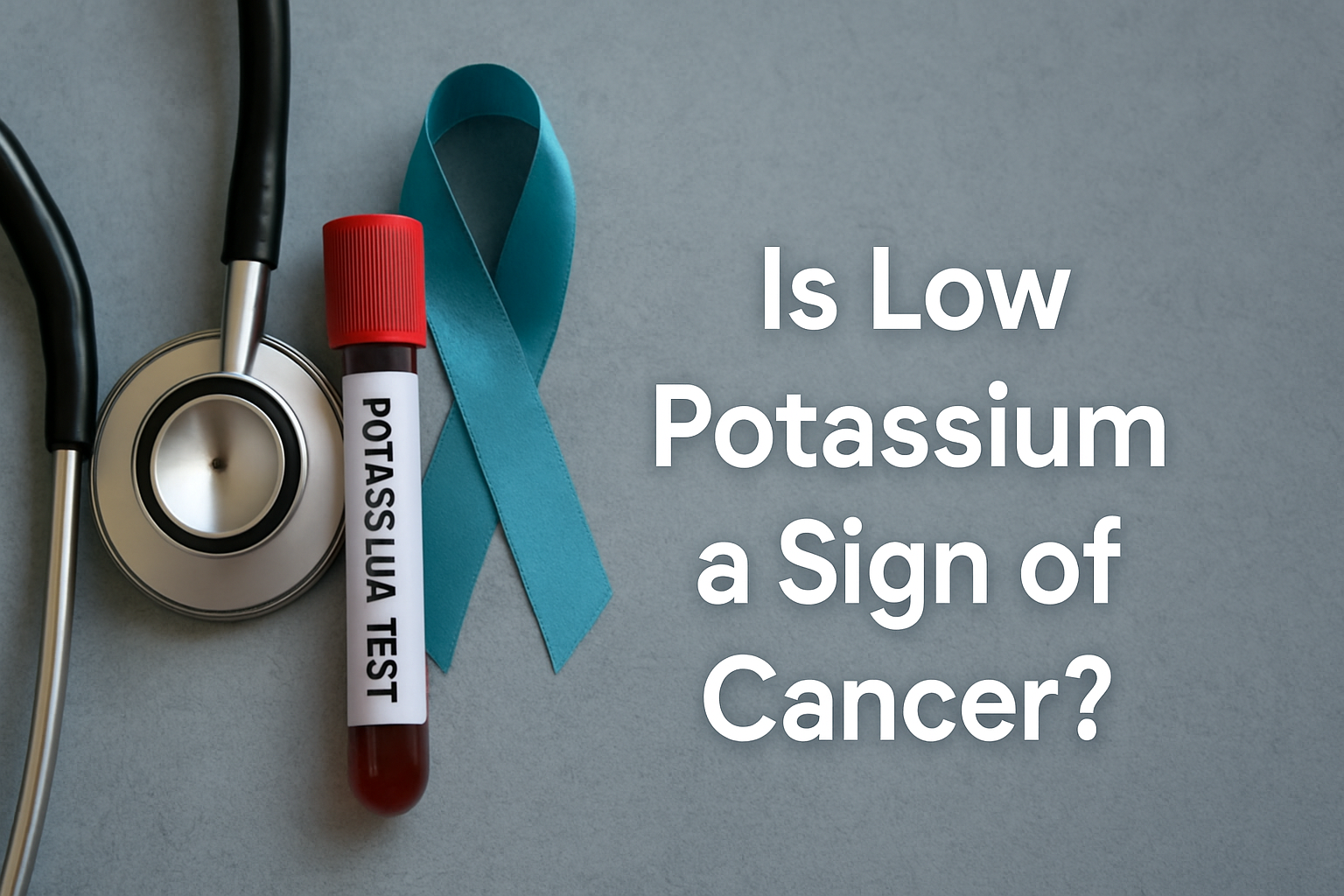Introduction to Low Potassium in the Body
Low Potassium a Sign of Cancer?:Potassium is a crucial electrolyte that plays a vital role in maintaining proper nerve function, muscle contractions, and fluid balance in the body. The normal potassium level in the blood ranges between 3.5 to 5.0 mmol/L, and any deviation from this range can lead to health complications.
Hypokalemia (low potassium) occurs when potassium levels drop below 3.5 mmol/L, leading to symptoms like fatigue, muscle cramps, and irregular heartbeats. While low potassium can result from poor diet, excessive sweating, or medications, in rare cases, it may also be linked to serious conditions like cancer.
Understanding the connection between low potassium and cancer is essential for early detection and treatment. This article explores whether low potassium is a sign of cancer, its role in the body, symptoms of deficiency, and ways to maintain optimal levels.
Is Low Potassium a Sign of Cancer?
Low potassium alone is not a definitive sign of cancer, but it can be associated with certain cancers and cancer treatments. Some cancers, particularly those affecting the kidneys, adrenal glands, or digestive system, may lead to potassium imbalances.
- Adrenal gland tumors (e.g., Conn’s syndrome) can cause excessive aldosterone production, leading to potassium loss.
- Leukemia and lymphoma may cause tumor lysis syndrome, where rapid cancer cell breakdown releases potassium into the bloodstream, followed by sudden drops.
- Colorectal and stomach cancers can interfere with nutrient absorption, leading to deficiencies.
Also Read: /gluten-free-chocolate/
According to the National Cancer Institute (NCI), chemotherapy and certain medications can also deplete potassium levels. While low potassium is not a direct cancer symptom, persistent hypokalemia without an obvious cause should prompt further medical investigation.
Can Potassium Be Used for Cancer Treatment?
Potassium itself is not a cancer treatment, but maintaining proper levels is crucial for patients undergoing therapy. Some studies suggest that potassium-rich diets may help reduce cancer risk due to their alkalizing effects and role in cellular function.
- A 2016 study in the International Journal of Cancer found that higher potassium intake was associated with a lower risk of colorectal cancer.
- Potassium helps regulate cell proliferation and apoptosis (programmed cell death), which are critical in preventing tumor growth.
However, excessive potassium (hyperkalemia) can be dangerous, especially for cancer patients with kidney dysfunction. Always consult a doctor before making dietary changes during cancer treatment.
Potassium’s Role in the Body
Potassium is essential for:
- Regulating heartbeat and muscle contractions
- Maintaining nerve function
- Balancing fluids and electrolytes
- Supporting kidney and adrenal function
- Lowering blood pressure by counteracting sodium effects
The American Heart Association (AHA) recommends 2,600–3,400 mg of potassium daily for adults to support cardiovascular health.
Signs of Low Potassium in the Body
Symptoms of hypokalemia include:
- Muscle weakness or cramps
- Fatigue and dizziness
- Irregular heartbeat (arrhythmia)
- Constipation or digestive issues
- Tingling or numbness
Severe potassium deficiency (<2.5 mmol/L) can lead to paralysis, respiratory failure, or cardiac arrest.
Ways to Fulfill Potassium Requirements for the Body
The best way to maintain potassium is through a balanced diet:
- Bananas (422 mg per medium banana)
- Sweet potatoes (450 mg per cup)
- Spinach (540 mg per cooked cup)
- Avocados (485 mg per half)
- Coconut water (600 mg per cup)
The FDA recommends consuming at least 4,700 mg of potassium daily for optimal health.
Natural Remedies for Low Potassium
If diet alone isn’t enough, consider:
- Drinking coconut water (natural electrolyte booster)
- Eating potassium-rich smoothies (banana + spinach + yogurt)
- Reducing sodium intake (excess salt depletes potassium)
Potassium Side Effects
While potassium is essential, too much (hyperkalemia) can be dangerous, especially for those with kidney disease. Symptoms include:
- Irregular heartbeat
- Nausea and vomiting
- Muscle weakness
Always consult a doctor before taking potassium supplements.
Potassium Supplements
For those unable to meet potassium needs through diet, supplements like:
- Potassium chloride
- Potassium citrate
However, high-dose supplements should only be taken under medical supervision due to risks of toxicity.
Low and Normal Potassium Levels
| Category | Potassium Level (mmol/L) |
|---|---|
| Normal Range | 3.5 – 5.0 |
| Mild Deficiency | 3.0 – 3.4 |
| Moderate Deficiency | 2.5 – 2.9 |
| Severe Deficiency | <2.5 |
Low potassium Conclusion
While low potassium is not a direct sign of cancer, it can be linked to certain cancers and treatments. Maintaining optimal potassium levels through diet or supplements is crucial for overall health. If you experience persistent symptoms of hypokalemia, consult a healthcare provider for proper diagnosis and treatment.
Sources:
- National Cancer Institute (NCI)
- American Heart Association (AHA)
- International Journal of Cancer (2016 Study)
- FDA Dietary Guidelines




